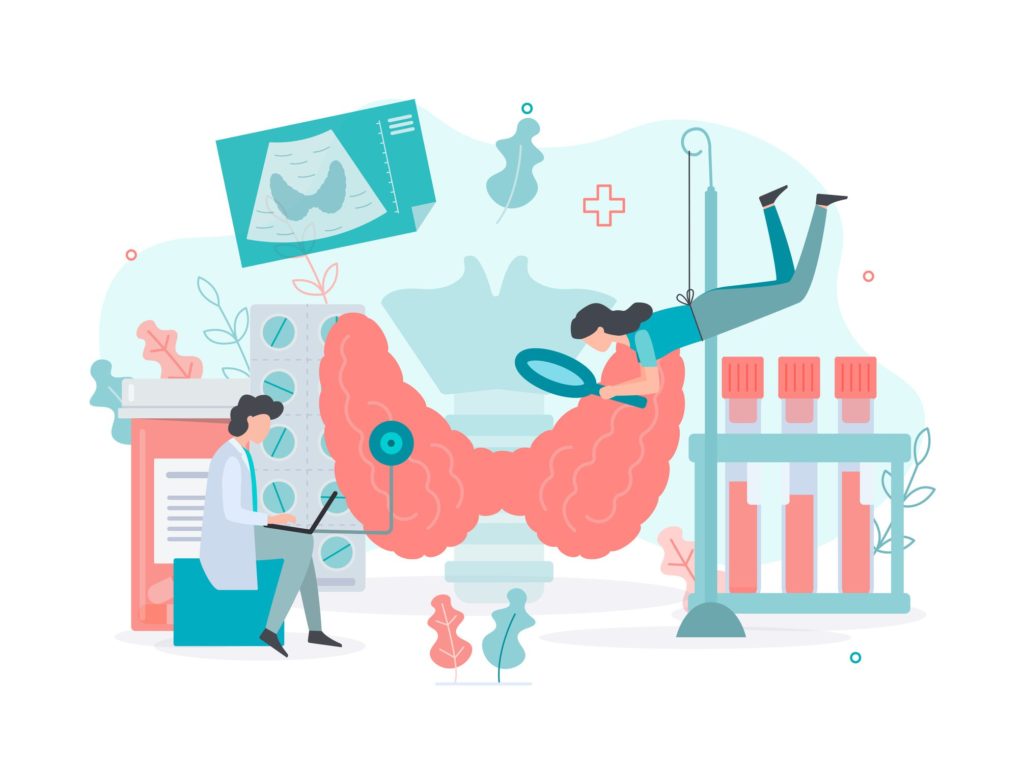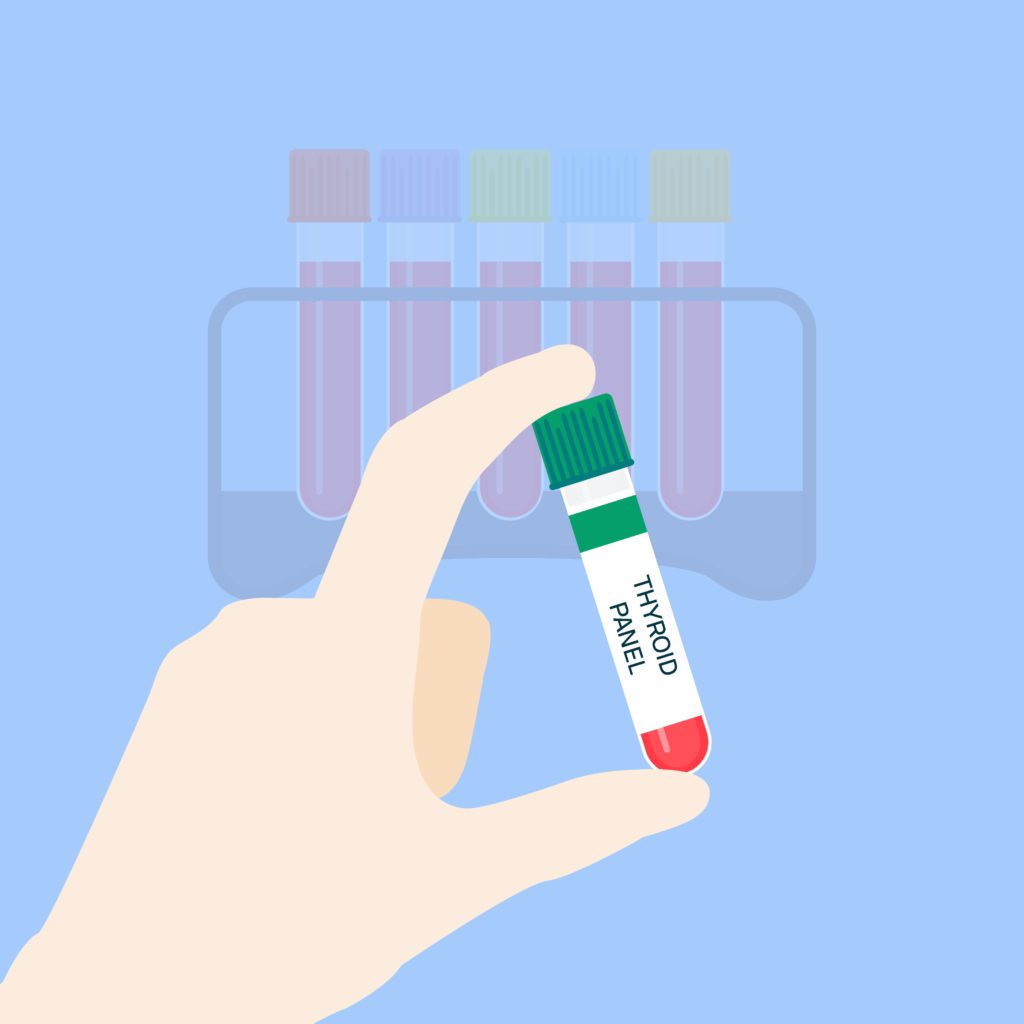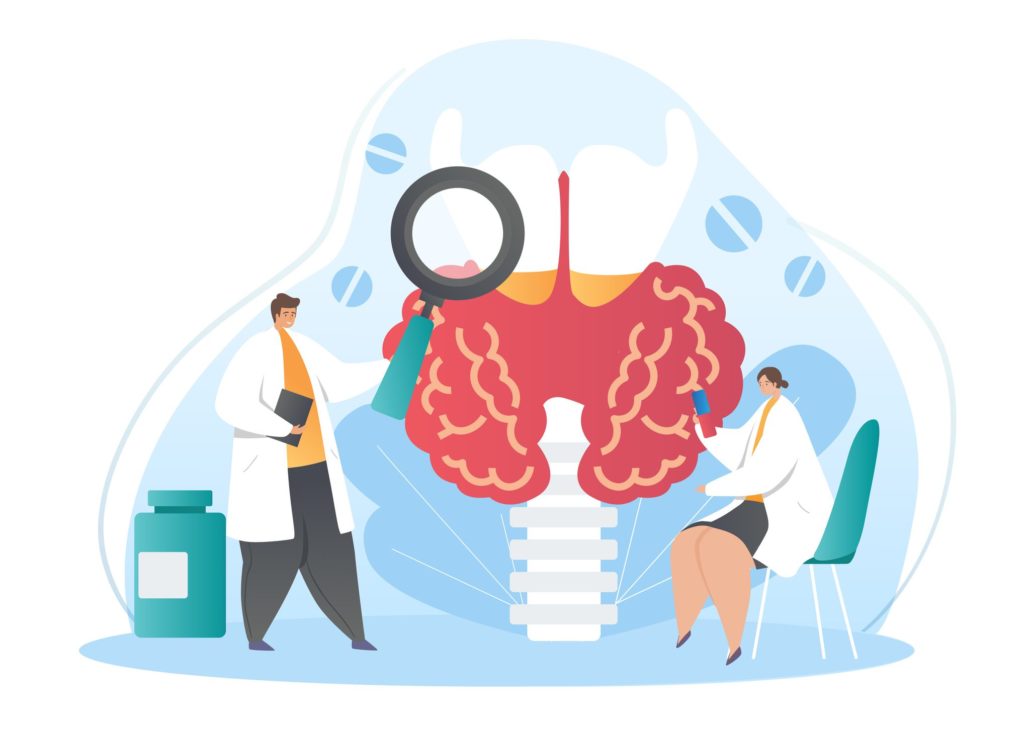When Emily Halevy was 28, she got stuck in a depression she couldn’t seem to shake. She was seeing a therapist and a psychiatrist and even taking antidepressant medication, plus working out regularly. But none of it was helping. “What I remember the most was just a feet-in-mud kind of feeling where I just didn’t have the energy to move,” says Halevy. “It took everything out of me to work out.”
Halevy, now a 42-year-old mom to two and sales executive in Atlanta, mentioned all of this to her gynecologist at her annual exam. Her doctor suggested they do some bloodwork to see if something might be off with her thyroid, and “sure enough, it came back, and I was hypothyroid,” says Halevy. “That wasn’t even on my radar.”
“It wasn’t on my radar” are the same words Atlanta mom Sara Lake uses to explain why it took her so long to get help for her thyroid condition. “I have four kids, and they are spaced out such that I didn’t feel like myself for so long I didn’t know if there was anything wrong,” says Lake, 42.
Five years ago, the former athlete and stay-at-home parent started noticing she couldn’t get up the stairs without getting out of breath. She felt tired and achy for no reason and was losing weight without meaning to. A few months later, she noticed her hands shaking when she held a glass of ice water. The cubes clinked together from the motion. And her anxiety, always a low-key companion, kicked into high gear. She cried with worry for her kids’ safety anytime her husband took them out of the house. Plus, she was sweating. A lot. But she chalked it up to the Atlanta heat.
Thyroid disorders will affect one out of eight women in their lifetime, but many will go undiagnosed.
Finally, someone close to her suggested she see a doctor who ordered a blood test and found that her thyroid hormone was sky-high (hyperthyroidism). “Looking back, it’s so obvious,” says Lake. “I was sitting on a pot of boiling water that was getting hotter and hotter, and I didn’t notice.”
Both Halevy and Lake are far from alone. The symptoms of thyroid disorders can be easily mistaken for other conditions or even written off as just a part of modern life or motherhood. In fact, the American Thyroid Association estimates that 60% of people with a thyroid condition (most of them women) don’t even know they have it. But, listening to the signals your body is sending can help you get the medical treatment to start feeling like yourself again — before the pot boils over. Here’s what you need to know.
What the thyroid does

The thyroid is a butterfly-shaped gland that sits at the front of your neck. Its job is to take iodine from your food and turn it into two important hormones, triiodothyronine and thyroxine. These hormones are important for healthy growth — of things like hair, skin, and nails — and your metabolism, which is the process your body uses to turn food into fuel and is key to your energy level. Sometimes your thyroid gland can get out of whack and produce too little — or too much — thyroid hormone, leading to the kinds of symptoms Halevy and Lake had and putting you at risk for other health conditions.
Hypothyroidism
Also called underactive thyroid, Halevy’s living condition happens when your thyroid gland does not make enough of the hormones you need. It “is common in women,” says Tara Kim, MD, a board-certified endocrinologist in New York City and assistant professor of clinical medicine at Hofstra University, “and the symptoms are typically vague.”
What are the symptoms of hypothyroidism?
- Fatigue
- Constipation
- Changes in your skin or hair (especially dry skin)
- Depression
- Greater sensitivity to cold temperatures
- Joint pain or muscle aches
- Memory problems
- Weight gain or difficulty losing weight
- A swollen thyroid (also called a goiter)
- A slower heartbeat
- Changes in your menstrual cycle
The challenge is that these symptoms are common to many conditions, and some can even seem normal. “If I were to go out and ask women, ‘are you tired? Do you have hair problems?’ a lot of them would say yes,” says Kim, “but it might not be specific to their thyroid.” Or, it might, which is why it’s important to have your provider check your levels with a simple blood test if you are experiencing these symptoms.
What causes hypothyroidism
The most common cause of hypothyroidism is an autoimmune condition called Hashimoto’s, in which your body creates antibodies that attack and can destroy your thyroid. The condition often runs in families. Other causes include:
- Radiation treatment to your neck that has damaged your thyroid.
- Surgery that has removed part of your thyroid.
- Medications, including lithium, can affect hormone production in your thyroid.
- Too little iodine in your diet (this is not common in the US because iodine is added to table salt).
- Problems with your pituitary gland.
The connection between pregnancy and hypothyroidism
Some women develop hypothyroidism during or after pregnancy, possibly because their body attacks the thyroid gland as it does in Hashimoto’s. “Just going through pregnancy can cause changes to your thyroid levels,” says Kim. It’s important to treat hypothyroidism during pregnancy because it can increase the risk of complications such as miscarriage, preterm birth and preeclampsia.

How hypothyroidism is treated
In some cases, if your thyroid levels are on the borderline, doctors “treat based on symptoms,” says Kim. “If you feel totally fine, we watch and wait.” Unless you are trying to get pregnant, in which case, Kim says, it’s important to make sure your thyroid is well regulated to help with conception and ensure a healthier pregnancy.
For women who have low levels of both hormones or have significant symptoms, the treatment is usually straightforward. It involves taking a synthetic (man-made) thyroid hormone, Levothyroxine, as a pill daily. It does the job your thyroid hormones would do if you were producing the correct amount of them, and it doesn’t cause many side effects. In the first two months of treatment, your provider will regularly check your levels and adjust the dose as needed.
Some women who don’t see improvement with levothyroxine may use what are called “compounded hormones,” says Kim, which are medications created by compounding pharmacists that use natural thyroid hormone, often from pigs. However, not all providers are comfortable with this approach since the Food and Drug Administration has not approved it.
Hyperthyroidism
As the name suggests, hyperthyroidism — what Sara Lake was diagnosed with — happens when your thyroid is overactive and produces too much thyroid hormone, which leads to the uncomfortable symptoms she experienced.
Symptoms of hyperthyroidism
- Skin and hair changes (usually thinning)
- Weight loss
- Anxiety, nervousness or irritability
- Fast or irregular heart rate
- Feeling worked up
- Feeling like your heart is pounding
- Shaking (like when Sara held the ice water)
- Sweating
- Fatigue
- Muscle weakness
- Having more frequent bowel movements
- Swelling in your neck from an enlarged thyroid
If you have any of these symptoms, it’s a good idea to check in with your primary care provider and see if they suggest you get a blood test to look at your thyroid levels. If your levels are too high, your doctor will probably perform an imaging exam to look for the cause of your hyperthyroid.
What causes hyperthyroidism
“Hyperthyroidism is a bit more complicated than hypothyroidism,” says Kim. “You have to figure out what is causing it. Sometimes it’s an autoimmune condition like Grave’s disease. Sometimes pregnancy.” Grave’s— in which your immune system makes antibodies that cause your thyroid to produce too much thyroid hormone — is the most common cause of hyperthyroidism. Other causes include:
- Overactive thyroid nodules (also called toxic nodules or Plummer’s disease) are non-cancerous growths on your thyroid that overproduce thyroid hormone.
- Swelling in your thyroid gland, also called thyroiditis, can cause it to leak thyroid hormone. This can happen after pregnancy.
- Consuming too much iodine.
How hyperthyroidism is treated
There are several treatment options for hyperthyroidism, depending on what is causing it.
- Anti-thyroid medications stop your thyroid from overproducing hormones. They take a little while to work, and you may be on them for one to two years. For some people, these medications do the trick. For others, you may need a repeated or different treatment in the future.
- Radioactive iodine taken as a pill or liquid gets absorbed by your thyroid gland, which shrinks in response. It’s possible this treatment can cause hypothyroidism, for which you will also need to be treated (see above “How hypothyroidism is treated”).
- Beta-blockers are blood pressure-lowering medications that don’t treat your thyroid but can help reduce some of the symptoms — like a rapid heart rate or shaking — until the thyroid medication kicks in.
- Surgery — during which part of your thyroid gland is removed — is an option for pregnant women or, for other reasons, cannot have one of the other treatments. If most or all of your thyroid was removed, you would need to take synthetic thyroid hormone for the rest of your life to avoid hypothyroidism.

The bottom line when it comes to thyroid health
Thyroid disorders will affect one out of eight women in their lifetime. Still, many will go undiagnosed, making women miserable at best or leading to more serious health problems at worst. If you do not feel like yourself, don’t write it off as madness, modern life, motherhood, or something else. You deserve to feel better and get medical treatment if you need it. Listen to your body and talk with your doctor.







